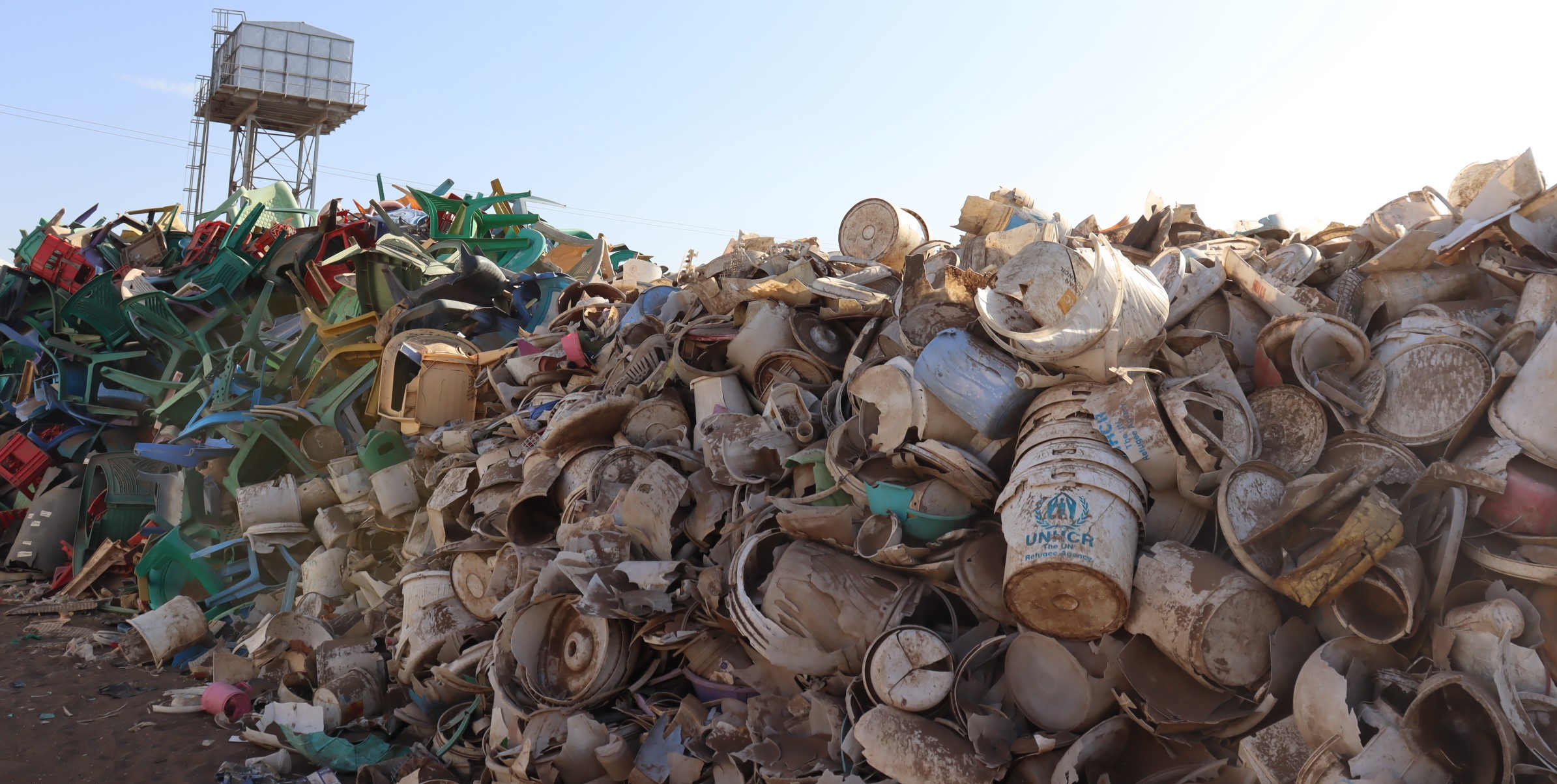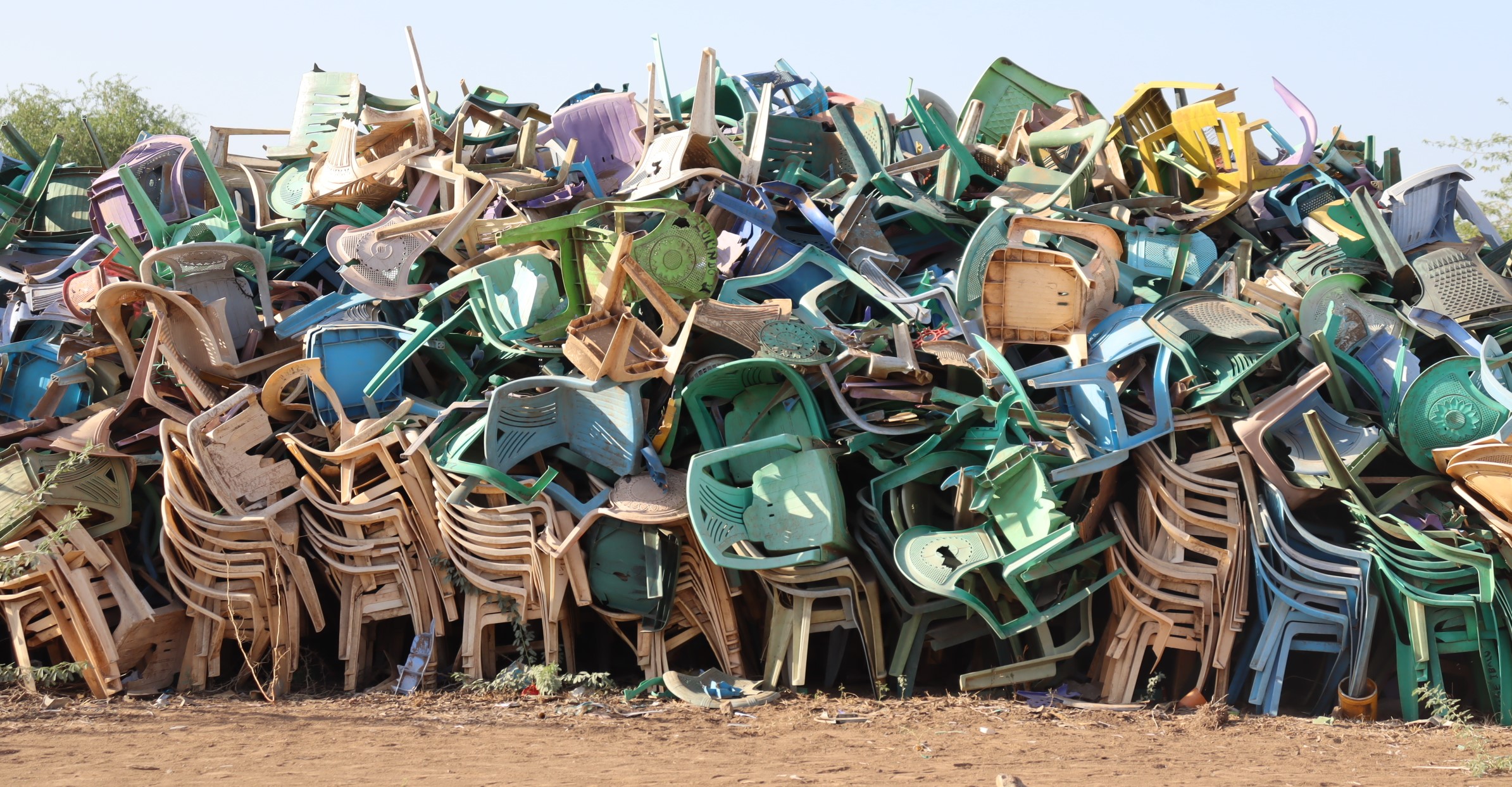By Tolossa Asrat – KANERE Volunteer Writer, December 2022
In 2019, refugees in Kakuma Refugee Camp piloted a waste management project to keep their environment clean. Based on the principles of environmental sustainability, Fraternity for Development Integrated (FRADI) – a refugee-led organization – initiated a recycling project in Kakuma 2 to safeguard the environment and health of the community. By converting waste into useful products, the organization has now embarked on a journey to address pressing social, environmental and climate challenges.

“Six years ago, in 2013, a similar community-based project was launched to reduce waste pollution in the camp, but it was discontinued due to a lack of waste disposal space,” Rafael recalls.
Recycling Waste
Over 400 women and 11 disabled individuals are now protecting their environment by collecting and recycling plastic and non-degradable products. Recycling is a method used to convert waste materials into useful products to be reused. The team starts the recycling process every morning by collecting waste materials in each block across the four camps of Kakuma Refugee Camp and three villages of Kalobeyei settlement. Typical waste materials collected include plastic chairs, aluminium cans, glass bottles, paper, wood, and plastics. They then transport these materials to Kakuma 2, Zone Block 2 to sort them into similar categories.
“Kakuma was so dirty, so we took the initiative and mobilized the community with an intention to clean our community and protect the environment,” says Rafael Basima, the project manager and a Congolese refugee who fled from the Democratic Republic of Congo in 2009. “The major concern is environmental health, and now we are working to curb climate change by reducing plastic and other waste that generates too much carbon.”
Recycling also reduces the energy required for sourcing and processing new raw materials, thus producing lower carbon emissions. It also potentially keeps methane-releasing waste out of landfill sites.
Kakuma Refugee camp, a three-decade-old camp, produced stockpiles of waste materials harmful to the environment and human beings. Waste disposal sites were the main challenge faced by organizations like FRADI. The camp was designed to have a maximum capacity of 70,000 residents, but by August 2022, the population had risen to over 200,000. This led to the Turkana County government allocating land for a new settlement that integrates both refugees and the host community about 40km northwest of Kakuma. “A lack of disposal space, especially in sub-camps, was one of our main challenges,” Rafael.
FRADI successfully secured one hectare of land in Kakuma 2 from the county government and an additional hectare of land from the Department of Refugee Service for its Kalobeyei project in Village 1. Last year, FRADI expanded its operation to the Kakuma and Kalobeyei towns areas inhabited by host communities.
The FRADI initiative has contributed significantly to the reduction of plastic waste in Kakuma, Kalobeyei and surrounding towns. “Since the project was launched in November 2019, more than 10 tons of plastic have been recycled, improving living conditions and generating income for the members,” Rafael added.
Through recycling technology, FRADI develops products to respond to the needs of the community. New recycled final products include pegs, cups, plates, school rulers and protective gear like COVID-19 masks.
Currently, the organization has two processing machines used for recycling plastics. Through remelting and reforming processes, the organization recycles plastics into valuable new products to be resold to refugee communities. Income generated from sales of recycled items is used for operational expenses and generating income for its 500 members. The majority of FRADI’s members are refugee women from different nationalities. To date, FRADI sold 38 tons of semi-recycled materials to eight local companies in Nairobi.

According to Rafael, FRADI generates income every month from waste management. However, this achievement did not come easily. In the early days, women members faced strong cultural resistance from fellow refugee communities. “People used to joke and mock us.” For collecting plastics.
In a bid to address soil erosion, flooding and strong winds, in 2022, FRADI planted over 5000 trees in refugee camps and host communities. With over 200,000 refugees living in Kakuma and the new settlement, high demand for firewood, inadequate spaces for disposing liquid and solids, water shortages are some of the existing challenges in both camps. Many refugees have settled in resource scarce Kakuma and Kalobeyei areas, putting further pressure on trees, land, water, and wildlife.
“The 17 Sustainable Development Goals (SDGs) are integrated—they recognize that action in one area will affect outcomes in others, and that development must balance social, economic and environmental sustainability,” UNDP Kenya states.
Trees produce oxygen and clean carbon dioxide. Without trees, life cannot continue. Trees also remove airborne particles from the air and reduce smog, thereby improving the air we breathe and our respiratory health. The work trees do in improving air quality is one of the most critical ways in which we benefit from trees. So far, FRADI planted over 9000 trees including mango, avocado and papaya trees in nearby host communities. On April 22, while commemorating World Earth Day with the theme of investing in our planet, the team planted 100 trees in host communities.
As climate change continues to be a pressing issue, supporting refugee-led grassroots organizations that are already making an impact like FRADI is one best ways to contribute to climate change efforts. It has been said that individual action towards climate change can lead to a greater collective impact in the future. According to the UN Campaign for Individual Action, changing the way we eat, travel, and use electricity can make a difference as two-thirds of global greenhouse gas emissions are emitted by private households.
When Speaking about the challenge, Rafaele said, “The major problem now for the organization is access to capital from local banks. However, banks are demanding assets to keep as security and FRADI does not have assets to offer to the local banks as security.
During this interview, FRADI requested a 5 million KSH loan targeting to plant 10,000 trees to create artificial forests inside host communities while offering 2000 jobs for both host and refugee youths through Kakuma Kalobeyei Challenge Fund (KKCF)- is a program of the International Finance Corporation (IFC), implemented with the Africa Enterprise Challenge Fund.
